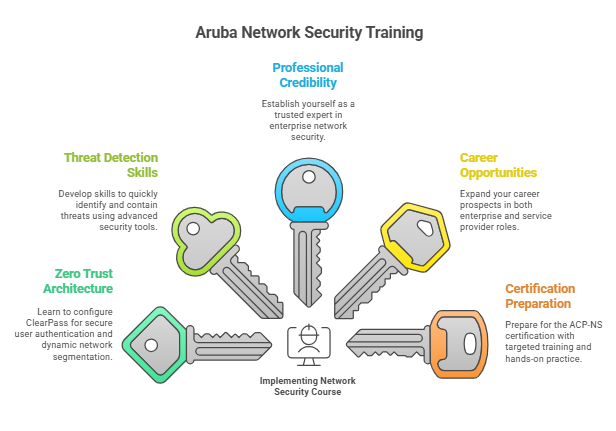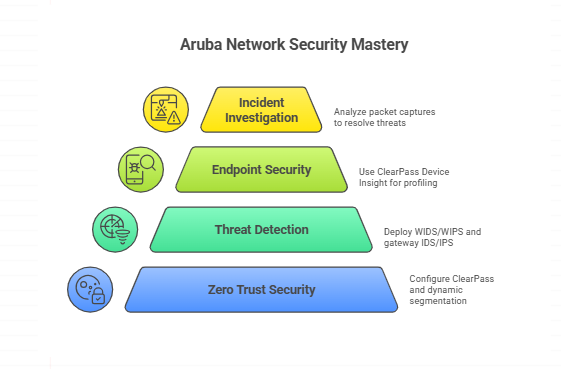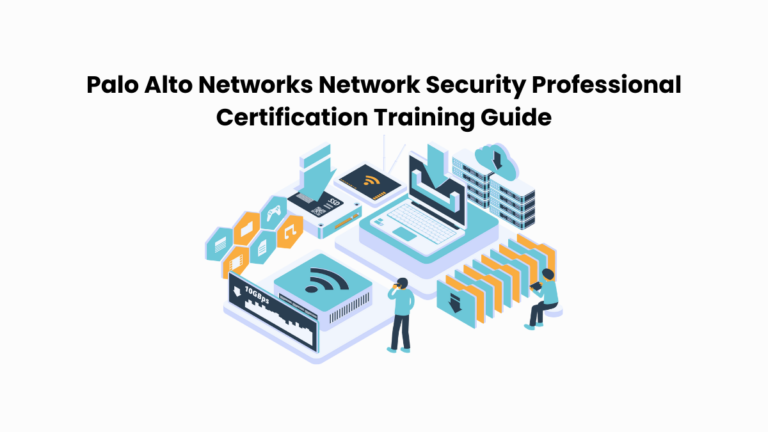Today’s enterprise network teams operate under constant pressure. You must secure complex, distributed infrastructures while staying ahead of evolving threats, all without disrupting operations. For professionals running Aruba-powered environments, accuracy and consistency are critical. Without the right training, even the most advanced security platforms can’t deliver their full potential.
That is where the Implementing Network Security course comes in. From ClearPass authentication to advanced firewall policies, WIDS/WIPS deployment, and gateway IDS/IPS configuration, it equips you with practical skills to strengthen your Zero Trust strategy.
As an HPE Aruba Networking Authorized Learning Partner, Datacipher Education Services delivers this course with expert precision. So, whether you are enhancing an existing deployment or implementing a new enterprise security architecture, Datacipher ensures you are ready.
In this article, you will get a complete breakdown of the Implementing Network Security course, including objectives, content, benefits, and ideal audience. You will also learn how to enroll and where it fits in your ACP-NS certification path. Let’s dive in.
Why Take the Implementing Network Security Course?
Enterprises are accelerating their Zero Trust adoption. By the end of 2025, 60% of organizations will have made Zero Trust a core component of their cybersecurity strategy. Done right, it can cut incident response times by 50%, but only if your team has the right skills to implement it.
Here’s how this training helps you grow:
#1. Master Aruba’s Zero Trust architecture
You will learn to configure ClearPass for wired, wireless, and remote user authentication. You will also be able to apply role-based policies and segment networks dynamically with AOS-CX firewalls.
#2. Strengthen your threat detection and investigation skills
You will learn how to use WIDS/WIPS, gateway IDS/IPS, and ClearPass Device Insight to spot and contain threats faster. It would help you confidently investigate alerts and anomalies.
#3. Build credibility as a network security professional
You can position yourself as the go-to expert for securing enterprise networks with Aruba solutions. Consequently, you will be able to demonstrate your ability to design and operate modern, resilient security infrastructures.
#4. Expand your opportunities in enterprise and service provider roles
Whether you work in-house or with a managed service provider, these skills are in demand globally, from enterprise deployments to managed network security services.
#5. Prepare for the HPE Aruba Networking ACP-NS Certification
This course maps directly to the ACP-Network Security (ACP-NS) certification objectives, giving you the platform expertise and hands-on practice to succeed in the exam. You can find the exam details here.

Want a preview before you enroll? If you’d rather watch than read, this short video walks you through the Implementing Network Security course. From the skills you’ll gain to the roles it supports, you’ll get a clear sense of how it can elevate your career.
Implementing Network Security Course Overview
| Feature | Details |
| Course Duration | 5 days |
| Delivery Format | Instructor-led and virtual instructor-led training |
| Course Level | Intermediate |
| Target Audience | 1. Network engineers responsible for implementing security controls on enterprise networks. 2. Professionals with knowledge of network security fundamentals. 3. Individuals aiming to apply Zero Trust Security using HPE Aruba Networking solutions. 4. Those preparing for the ACP-Network Security (ACP-NS) certification. |
| Prerequisites | HPE Aruba Networking Security Fundamentals course, or equivalent experience with network security fundamentals and the security stack (firewall, proxy, IDS/IPS, access control, NTA, UEBA). |
| Training Credits | Eligible for HPE Training Credits |
| Course Fees | INR 85000 |
Target Audience
The Implementing Network Security course is designed for:
#1. Network engineers responsible for implementing security controls on enterprise networks.
#2. Professionals with a working knowledge of the network security stack, including firewalls, proxies, remote access, IDS/IPS, access control, NTA, and UEBA.
#3. Those looking to apply Zero Trust Security principles using HPE Aruba Networking solutions.
#4. IT professionals preparing for the ACP-Network Security (ACP-NS) certification.
Prerequisites
Before attending this course, you should have:
a. Completed the Aruba Networking Security Fundamentals course, or have
b. Equivalent experience in network security fundamentals, including understanding and working with firewalls, proxies, IDS/IPS, access control systems, NTA, and UEBA.
These prerequisites ensure you can keep pace with the intermediate-level content and hands-on labs.
Enrolling in the Implementing Network Security Course
The Implementing Network Security course is delivered by HPE Aruba Networking’s Authorized Learning Partners, including Datacipher Education Services. Whether you prefer an immersive instructor-led classroom or a convenient virtual format, enrolling is straightforward.
Here’s how you can register:
#1. Visit the HPE Aruba Networking Training and Certification website
Go to the training portal and search for Implementing Network Security Rev. 24.41 or Course ID 0001210365 to view available sessions.

Source: HPE
#2. Select your preferred delivery format
Choose between instructor-led or virtual instructor-led training based on your learning style and schedule.
#3. Filter by location and time zone
Use filters to select your region, preferred language, and training calendar slot that fits your availability.
#4. Enroll via Datacipher Education Services
For expert-led, real-world guidance, register through Datacipher, an HPE Aruba Networking Authorized Learning Partner delivering this course across APAC and globally.
#5. Access your course materials
Once enrolled, you will receive schedules, digital lab access, and learning resources directly from the training platform.
Datacipher Education Services offers both virtual and classroom formats led by Aruba-certified trainers with extensive deployment experience. Organizations can also arrange private, customized training tailored to their specific network environment.
Take the next step. Enroll through Datacipher and gain mastery over Aruba-powered Zero Trust security.
Implementing Network Security: What You Will Learn?
The Implementing Network Security course is designed to give network engineers and security professionals hands-on expertise in deploying, managing, and troubleshooting HPE Aruba Networking’s Zero Trust Security solutions. This structured five-day program combines instructor-led sessions with extensive real-world lab exercises, ensuring you can confidently protect enterprise networks using the Aruba security portfolio.
This course includes the following modules
1. HPE Aruba Networking Security Strategy and ClearPass Fundamentals
2. Deploying Trusted Certificates
3. Implementing Certificate-Based 802.1X Authentication
4. Applying Advanced Policies on the Role-Based AOS-CX Firewall
5. Evaluating Endpoint Posture
6. Implementing a Trusted Network Infrastructure
7. Deploying 802.1X and Role-Based Access Control on AOS-CX
8. Implementing Dynamic Segmentation on AOS-CX Switches
9. Monitoring with Network Analytics Engine (NAE)
10. Deploying Wireless IDS/IPS (WIDS/WIPS)
11. Integrating CPPM and Third-Party Solutions for Threat Mitigation
12. Implementing Device Profiling with CPPM
13. Deploying ClearPass Device Insight (CPDI)
14. Integrating Device Insight with CPPM
15. Using Packet Captures for Security Investigations
16. Securing Remote and Branch Access
17. Configuring HPE Aruba Networking Gateway IDS/IPS
18. Using Aruba Central Alerts for Incident Response
19. Use HPE Aruba Networking Central Alerts
By the end of this course, you will be able to:
#1. Configure and manage Aruba Zero Trust security
Set up ClearPass authentication, role-based firewall policies, and dynamic segmentation to secure wired, wireless, and remote access.
#2. Deploy and monitor Aruba’s threat detection tools
Use WIDS/WIPS, gateway IDS/IPS, and NAE analytics to identify and respond to security incidents in real time.
#3. Enhance visibility and endpoint security
Leverage ClearPass Device Insight for device profiling, classification, and integration with enforcement policies.
#4. Investigate and troubleshoot network security incidents
Collect contextual data, run packet captures, and analyze results to identify and resolve security threats.

You will also strengthen your ability to harden devices, secure network infrastructure, protect WLAN and WAN environments, and design VPN solutions using Aruba’s SD-Branch and VIA client. In addition, you will learn to classify endpoints, integrate security systems, and apply advanced enforcement policies to meet evolving enterprise security needs.
Next Steps
After completing the Implementing Network Security course, the next logical step is to earn the HPE Aruba Networking Certified Professional – Network Security (ACP-NS) certification, validating your skills in deploying and managing Aruba’s Zero Trust security solutions.
This certification demonstrates your ability to design, implement, and troubleshoot enterprise-grade security controls using the full Aruba Networking portfolio.
Become an Aruba Network Security Expert with Datacipher Education Services
Source: Datacipher
At Datacipher, we don’t just deliver HPE Aruba Networking training; we help network professionals become confident, capable leaders in enterprise security. As an HPE Aruba Networking Authorized Training Partner, Datacipher Education Services has built a strong reputation for enabling engineers and administrators to master Aruba’s Zero Trust and network security technologies with precision and practical know-how.
Why choose Datacipher for Implementing Network Security training?
1. Trusted Aruba training across APAC – Datacipher is recognized for certified Aruba instructors, hands-on expertise, and consistently delivering impactful, outcomes-focused training across the region.
2. Flexible learning options – Choose between virtual live instruction or in-person classes to match your schedule, time zone, and learning preferences.
3. Tailored for enterprise security teams – For organizations managing high-stakes security environments, Datacipher can deliver private, customized sessions aligned with your network architecture, tools, and compliance requirements.
Security engineers from global enterprises praise the clarity and relevance of the Implementing Network Security course, especially in applying ClearPass policies, configuring AOS-CX firewalls, and integrating Aruba’s threat detection tools. Our training is trusted by organizations such as Accenture, Wipro, and Infosys, and is built to deliver maximum real-world value.
One participant shared:
“The Implementing Network Security training gave us the skills to apply Zero Trust principles end-to-end. The labs were realistic, and the instructor’s expertise made all the difference.”
— Priya K., Senior Network Engineer
Take the next step toward advancing your Aruba security career. Choose Datacipher as your training partner and enroll today.
Frequently Asked Questions
1. What is Aruba Network Security?
Aruba Network Security is HPE Aruba Networking’s approach to protecting enterprise networks using Zero Trust principles. Also, it combines access control, segmentation, and threat detection tools, such as ClearPass, WIDS/WIPS, and IDS/IPS, to secure wired, wireless, and remote environments.
2. How does Zero Trust Security work in enterprise networks?
Zero Trust assumes no device or user is trusted by default, even inside the network. Access is granted only after continuous verification of identity, device posture, and context, limiting the impact of threats and preventing lateral movement.
3. What skills are tested in the ACP-Network Security (ACP-NS) certification?
The ACP-NS certification validates skills in deploying, managing, and troubleshooting Aruba security solutions. Also, it covers ClearPass authentication, role-based firewall policies, WIDS/WIPS, IDS/IPS, dynamic segmentation, and integrating visibility tools into a unified security strategy.
4. How can Implementing Network Security training advance my career?
The course equips you with in-demand skills for securing enterprise networks using Aruba solutions. These capabilities open opportunities in network engineering, security operations, and architecture roles.
5. Can ACP-NS certification help me transition into a cybersecurity role?
Yes. ACP-NS certification demonstrates your ability to design and operate Zero Trust security environments, making you a strong candidate for SOC, network security, and cybersecurity engineering positions.





